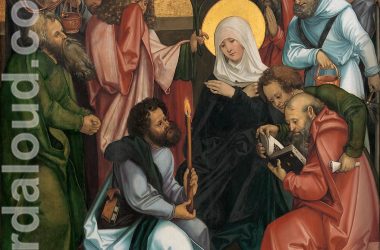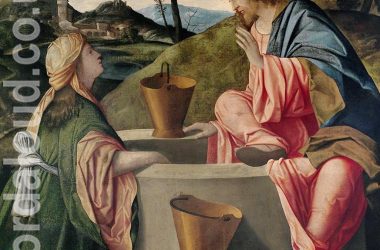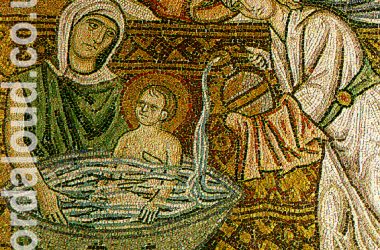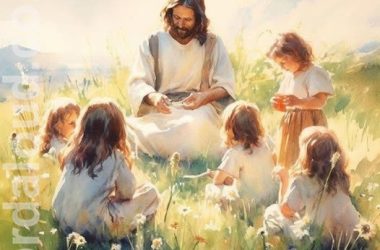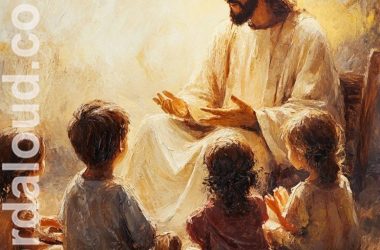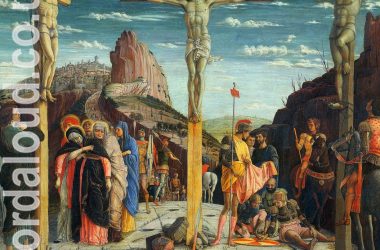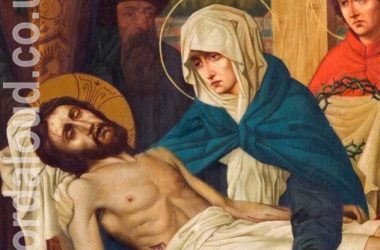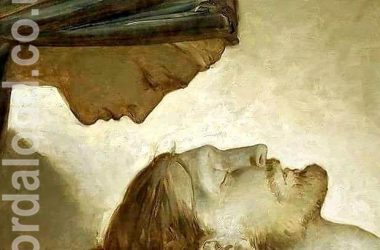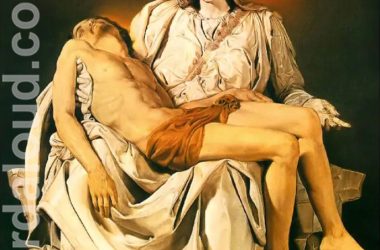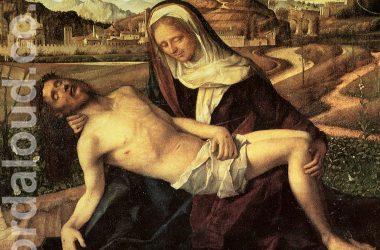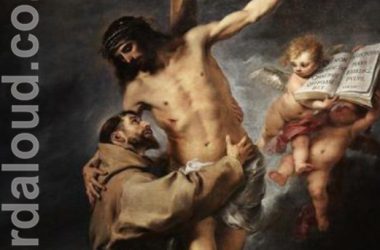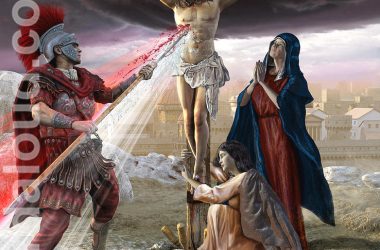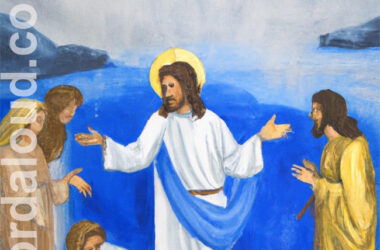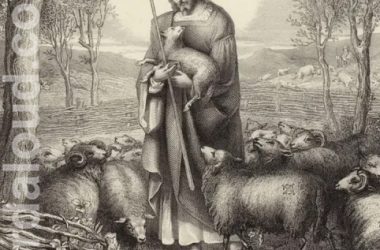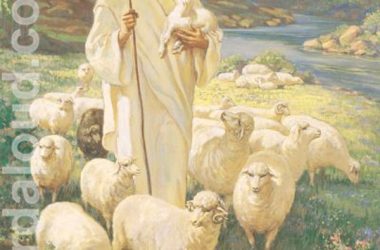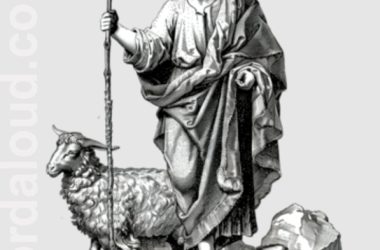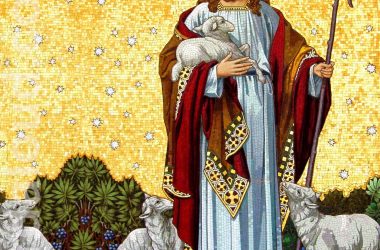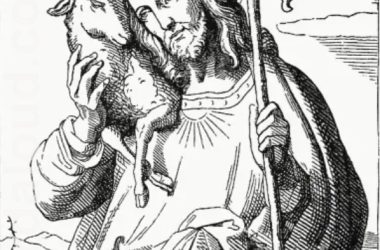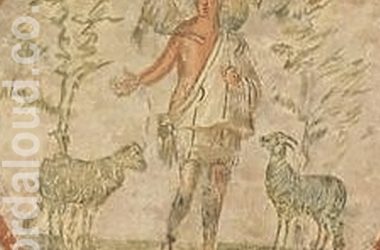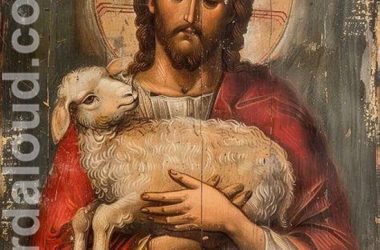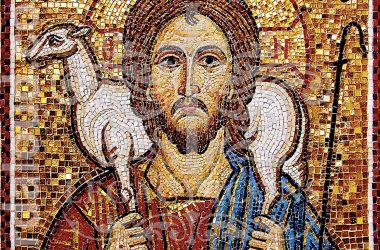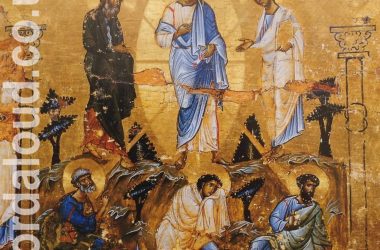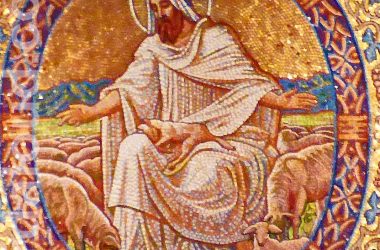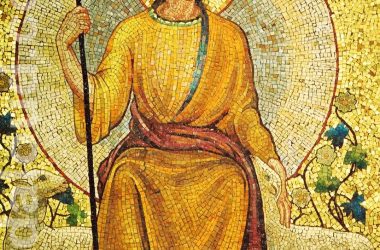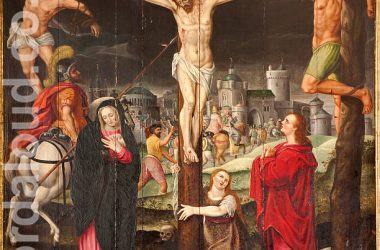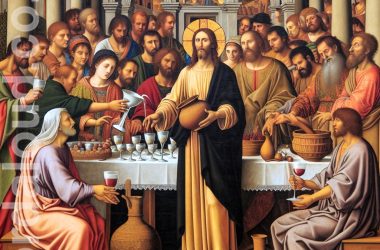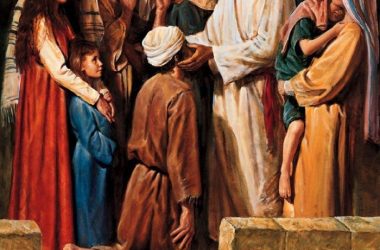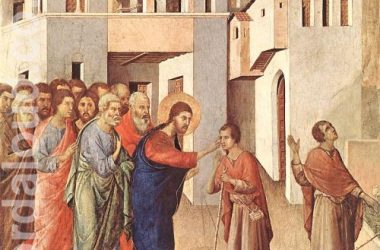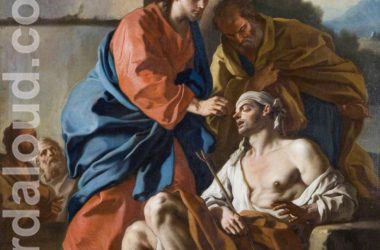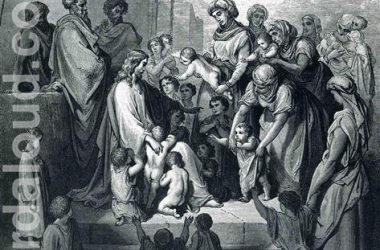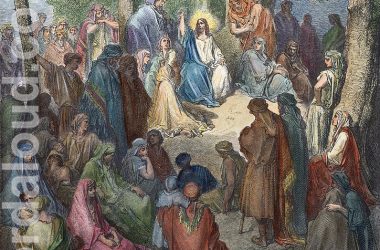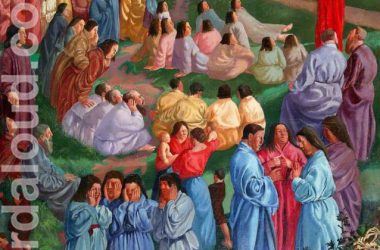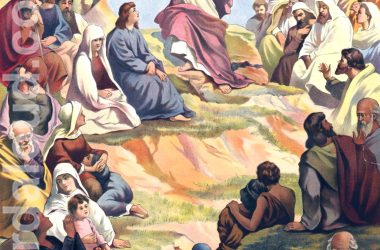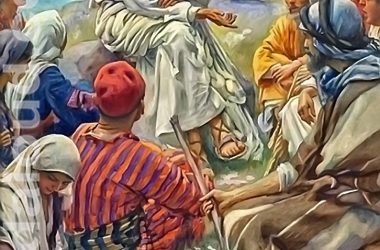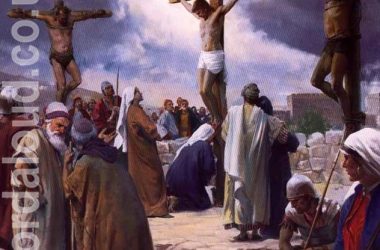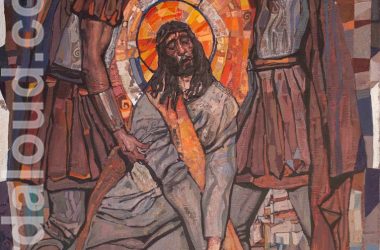Saint Ignatius of Antioch returns to one of his central themes: the inseparable unity of the Church under one bishop, presbyters, and deacons. His appeal is both pastoral and theological, shaped by his conviction that visible unity reflects the inner unity of Christ himself. For Ignatius, the structure of the Church is not a matter of administration but an expression of divine order [ … ]
Office Of Readings | Week 27, Wednesday, Ordinary Time | A Reading From The Letter Of Saint Ignatius Of Antioch To The Trallians | Renew Yourselves In Faith, The Flesh Of Christ, And Love, The Blood Of Christ
Saint Ignatius of Antioch brings together key themes of his spiritual teaching: unity in faith, love in action, and steadfastness in truth. His words are deeply personal, written by a man already bound in chains, on his way to Rome to face death for Christ. Yet the tone is not one of resignation but of renewal. Ignatius’s message is one of spiritual rebirth, of being born again in the faith that is the very body of the Lord, and in the love that is his blood [ … ]
Office Of Readings | Week 27, Tuesday, Ordinary Time | A Reading From The Letter Of Saint Ignatius Of Antioch To The Trallians | I Wish To Protect You In Good Time Because You Are Dear To My Heart
In his Letter to the Trallians, Saint Ignatius of Antioch offers both affection and warning to a Christian community he deeply admires. Writing on his journey to Rome, where he would face martyrdom around the year 107, Ignatius uses his correspondence to affirm unity, humility, and fidelity to the structure of the Church. His tone is that of a spiritual father who encourages steadfastness in faith while defending the young Church against division and false teaching [ … ]
Office Of Readings | Week 27, Monday, Ordinary Time | A Reading From The Treatise Of Saint Ambrose On Cain And Abel | We Pray For The Whole Body Of The Church
In this passage from his Treatise on Cain and Abel, Saint Ambrose reflects on the nature of Christian prayer as both personal and communal, inner and active. His interpretation moves beyond external forms and focuses on the transformation of the heart, the renewal of love, and the unity of the Church as the Body of Christ [ … ]
Office Of Readings | Week 27, Sunday, Ordinary Time | A Reading From The Pastoral Rule Of Pope Saint Gregory The Great | Let The Pastor Be Discreetly Silent, And To The Point When He Speaks
Saint Gregory the Great’s Pastoral Guide is among the foundational texts on Christian leadership and ministry. In this passage, Gregory explores the delicate balance required of every spiritual guide — the tension between silence and speech, between caution and courage. His words address pastors and teachers, but their insight extends to all who exercise responsibility for others [ … ]
Office Of Readings | Week 26, Saturday, Ordinary Time | A Reading From The Book Of Sain Gregory Of Nyssa On The Christian Life | Fight The Good Fight Of Faith
Saint Gregory of Nyssa’s reflection on Christian formation explores the transformation of the believer through the grace of the Holy Spirit. His theme ‘Fight the good fight of faith’ is taken from Saint Paul’s exhortation in the First Letter to Timothy (1 Tim 6:12). Gregory interprets this not as a call to conflict with others, but as a lifelong struggle against sin and the disorder of self-will [ … ]
Office Of Readings | Week 26, Friday, Ordinary Time | A Reading From The Commentary Of Saint Ambrose On The Letter To The Philippians | Be Joyful In The Lord Always
Saint Ambrose’s reflection on Philippians 4:4–6 centres upon the Apostle Paul’s call to rejoice in the Lord always. Written in the context of Ambrose’s pastoral work in Milan during the late fourth century, this passage draws together joy, moderation, and trust in God as essential expressions of Christian life [ … ]
Office Of Readings | Week 26, Thursday, Ordinary Time | From The Letter Of Saint Polycarp To The Philippians | May Christ Build You Up In Faith And In Truth
Saint Polycarp brings together the pastoral, theological, and practical elements that have characterised his message to the Philippians. Written in the early second century, it reflects the steady, humane tone of a bishop who has guided his community through times of trial and who now speaks from long experience in faith [ … ]
Office Of Readings | Week 26, Wednesday, Ordinary Time | From The Letter Of Saint Polycarp To The Philippians | Let Us Run In Faith And Holiness
Saint Polycarp speaks as both pastor and elder brother in the faith, urging his community to perseverance, unity, and moral integrity. His tone is both encouraging and corrective, grounded in the example of the saints and martyrs who have already completed their earthly race [ … ]
Office Of Readings | Week 26, Tuesday, Ordinary Time | From The Letter Of Saint Polycarp To The Philippians | Jesus Christ Set Us An Example In His Own Person
Saint Polycarp continues his reflection on the Christian life and the duties of the Church’s ministers. His words are both pastoral and deeply practical. He insists that presbyters — that is, priests or elders — must mirror the compassion and mercy of Christ himself. They are to care for the sick, the poor, widows, and orphans, the most vulnerable members of the community. Polycarp’s vision of ministry is not one of authority alone but of service, modelled on the Good Shepherd who lays down his life for the sheep [ … ]
Office Of Readings | Week 26, Monday, Ordinary Time | From The Letter Of Saint Polycarp To The Philippians | Let Us Be Armed With The Armour Of Integrity
Writing to the Philippians in the early second century, Saint Polycarp consciously places himself in continuity with Saint Paul, who had both preached in their city (Acts 16) and written to them decades earlier. His humility is striking: he openly acknowledges that he cannot rival the ‘wisdom of the blessed and glorious Paul’, yet he exhorts the faithful to live according to the same gospel Paul proclaimed. In this way, Polycarp embodies the role of a bishop as both guardian of apostolic teaching and shepherd of souls [ … ]
Office Of Readings | Week 26, Sunday, Ordinary Time | From The Letter Of Saint Polycarp To The Philippians | You Have Been Saved By Grace
Saint Polycarp’s letter to the Philippians addresses the Christian community with encouragement and exhortation. Saint Polycarp begins by commending their faith, describing it as deeply rooted and fruitful in the service of Christ. The mention of those who bore chains for the gospel situates his words in the context of persecution: suffering for Christ is presented as both a mark of honour and a participation in the Lord’s own passion [ … ]
Office Of Readings | Week 25, Saturday, Ordinary Time | From The Discourses Of Saint Hilary On The Psalms | The Water Of The River Gives Joy To God’s City
Saint Hilary reflects on the image of the river that gladdens the city of God, drawing together scriptural references to show that the river signifies the Holy Spirit. From the psalmist’s imagery of abundant waters, through Christ’s words in John’s Gospel, the Spirit is described as a source of life flowing from God into believers. The fullness of the river expresses the superabundance of divine gifts: the Spirit is not given sparingly but floods the Church with grace [ … ]
Office Of Readings | Week 25, Friday, Ordinary Time | From The Sermon Of Saint Augustine On The Shepherds | All Good Shepherds Are One In The One True Shepherd
Saint Augustine reflects on Christ’s words: ‘My sheep hear my voice and follow me.’ From this, he draws the principle that all true shepherds are united in Christ, the one true shepherd. Individual pastors do not act independently, for their voice is authentic only when it is the voice of Christ speaking through them. Unity is therefore essential: the many who share in Christ’s ministry form one in him, since division would contradict the reality of the one flock [ … ]
Office Of Readings | Week 25, Thursday, Ordinary Time | From The Sermon Of Saint Augustine On The Shepherds | I Will Feed My Sheep In Good Pastures
Saint Augustine reflects on the divine promise from Ezekiel: ‘I shall feed my sheep.’ He interprets the mountains of Israel as the sacred authors of Scripture, whose writings provide the true and safe nourishment of the flock. For Augustine, the faithful are to graze on these pastures by listening to the Word of God. Teachings that accord with Scripture are to be received; teachings that diverge from it must be rejected. This safeguards the flock from error and ensures that the food they consume is wholesome [ … ]
Office Of Readings | Week 25, Wednesday, Ordinary Time | From The Sermon Of Saint Augustine On The Shepherds | Do What They Say, Not What They Do
Saint Augustine addresses the duty of pastors to speak the truth even when that truth provokes resistance, and he warns the flock to distinguish between authoritative teaching and faulty example. He draws on Ezekiel’s imagery of negligent shepherds and on the watchman motif (Ezekiel 3:17–21): a pastor who fails to warn sinners bears responsibility for their ruin; a pastor who speaks the prophetic word but the people ignore it has done his duty [ … ]
Office Of Readings | Week 25, Tuesday, Ordinary Time | From The Sermon Of Saint Augustine On The Shepherds | The Church, Like A Vine, Growing And Spreading Everywhere
Saint Augustine reflects on Ezekiel’s image of scattered sheep and applies it to the life of the Church. Scattering is linked to pride, which leads individuals to pursue earthly goods rather than finding their life ‘buried in Christ’. Pride isolates, generating division and self-concern, while love unites through communion in the Church. The Church, as mother and shepherd, responds by seeking out the lost, binding up the weak, and maintaining unity across the whole world [ … ]
Office Of Readings | Week 25, Monday, Ordinary Time | From The Sermon Of Saint Augustine On The Shepherds | Be Urgent In Season, Out Of Season
Saint Augustine confronts the pastor’s duty to seek those who stray and to call back the lost, even when that task is resisted or resented. He frames the obligation in stark terms: sheep wander; wolves and robbers threaten; the shepherd must go after the weak and the scattered. The passage presses a practical point about pastoral courage. The preacher must ‘preach the word; insist upon it’ (cf. 2 Timothy 4:2) whether the hearers welcome or reject it [ … ]
Office Of Readings | Week 25, Sunday, Ordinary Time | From The Sermon Of Saint Augustine On The Shepherds | On Weak Christians
Saint Augustine continues his reflection on Ezekiel 34 and the charge against negligent shepherds. The Lord’s accusation—’You have failed to strengthen the weak’—is interpreted in relation to two categories of believers: the weak and the sick. Augustine distinguishes between the two. The weak are those who sincerely wish to live a good life and even attempt good works, but lack the endurance to withstand trials. Their danger is not wrongdoing but fragility under pressure. The sick, by contrast, are those weighed down by sinful desires that prevent them from doing good at all [ … ]
Office Of Readings | Week 24, Saturday, Ordinary Time | From The Sermon Of Saint Augustine On The Shepherds | Offer The Bondage Of Consolation
Saint Augustine develops his teaching on pastoral responsibility by focusing on how shepherds should address the realities of suffering and temptation in the Christian life. He begins with the principle from Hebrews 12:6: “God chastises every son whom he acknowledges.” This verse provides both warning and reassurance: chastisement is not a sign of rejection but of belonging, since even Christ, though sinless, endured suffering in the flesh. By sharing in discipline, the faithful are confirmed as adopted children of God and coheirs with Christ [ … ]
Office Of Readings | Week 24, Friday, Ordinary Time | From The Sermon Of Saint Augustine On The Shepherds | Prepare Your Soul For Temptation
Saint Augustine continues his critique of negligent shepherds by focusing on what they fail to provide for the flock. The concern here is not only with material exploitation, but with a more fundamental dereliction: the refusal to prepare believers for the trials that accompany the Christian life [ … ]
Office Of Readings | Week 24, Thursday, Ordinary Time | From The Sermon Of Saint Augustine On The Shepherds | Be A Model For The Faithful
Saint Augustine turns to the destructive power of bad example. Having already examined how negligent shepherds fail to feed or protect their flock, he now shows that their own behaviour can actively corrupt those they lead. Pastors are not only teachers by their words but also models by their lives. When their conduct contradicts the Gospel, they undermine the faith of the strong and damage the weak [ … ]
Office Of Readings | Week 24, Wednesday, Ordinary Time | From The Sermon Of Saint Augustine On The Shepherds | Let Each One Seek Not What Is His But What Is Jesus Christ’s
Saint Augustine continues his interpretation of the prophet Ezekiel’s condemnation of negligent shepherds (Ezekiel 34). His focus now turns from ‘milk’ to ‘wool’, using these images to explore the dangers of pastors seeking their own comfort and honour rather than Christ’s glory and the good of the flock [ … ]
Office Of Readings | Week 24, Tuesday, Ordinary Time | From The Sermon Of Saint Augustine On The Shepherds | Paul’s Example
In his sermon, Saint Augustine turns again to the responsibilities of Christian pastors, drawing his example from the Apostle Paul. The passage is shaped by Paul’s words in his letter to the Philippians (Philippians 4:10–20), written from prison, in which he acknowledges the gifts sent by the community. Augustine highlights Paul’s dual emphasis: while grateful for material help, Paul’s deeper joy lies in the spiritual fruit shown by the generosity of the Philippians [ … ]
Office Of Readings | Week 24, Monday, Ordinary Time | From The Sermon Of Saint Augustine On The Shepherds | Shepherds Feeding Themselves
Saint Augustine reflects on Ezekiel 34, where God condemns unfaithful shepherds who exploit the flock for their own benefit while neglecting their pastoral duties. The text distinguishes between the shepherds’ concern for themselves and their neglect of the sheep. The imagery of consuming milk and wearing wool symbolises the material benefits that leaders receive from their communities. These are not illegitimate in themselves, as Paul’s writings indicate, but they become corrupt when they are detached from genuine pastoral care [ … ]
Office Of Readings | Exaltation Of The Holy Cross | A Reading From The Homilies Of Saint Andrew Of Crete | The Glory And Exaltation Of Christ Is The Cross
Saint Andrew of Crete describes the Cross as both the lowest point of human suffering and the highest point of divine action. He frames the Cross as the moment in which apparent defeat is revealed as the means of victory, and where humiliation becomes the setting of glory. This tension is already present in the New Testament: Paul declares that the Cross is ‘foolishness’ to the world yet the ‘power of God’ for salvation (1 Corinthians 1:18), while John’s Gospel presents the crucifixion as the very moment of Christ’s exaltation (John 12:23–32) [ … ]
Office Of Readings | Week 24, Sunday, Ordinary Time | The Beginning Of The Sermon Of Saint Augustine On The Shepherds | We Are Christians And Appointed Leaders
Saint Augustine opens his sermon on pastors with a reflection that sets out the responsibilities of Christian leadership within the Church. He begins by affirming that Christ alone is the true Shepherd, the source of salvation and hope. The faithful are his flock, and all pastors serve only in relation to Christ’s own care [ … ]
Office Of Readings | Week 23, Friday, Ordinary Time | A Reading From The Sermons Of Blessed Isaac Of Stella | Without The Church, Jesus Christ Will Not Forgive
Blessed Isaac of Stella reflects on the close unity between Christ and the Church, especially in relation to the forgiveness of sins. He begins by affirming that two things belong to God alone: the right to receive confession and the power to forgive. Yet, he immediately links this divine prerogative with the mystery of Christ’s union with his bride, the Church [ … ]
Office Of Readings | Week 23, Thursday, Ordinary Time | A Reading From The Commentary Of Saint Bruno On the Psalms | If I Forget You, O Jerusalem
Saint Bruno reflects on the longing expressed in Psalm 84[83]: ‘How lovely are your tabernacles, O Lord of hosts.’ He interprets this not only as a reference to the Temple of Jerusalem but as pointing beyond it to the heavenly Jerusalem, the eternal dwelling place of God. For Bruno, the psalmist’s desire is ultimately for the courts of heaven, where blessedness consists in unending praise of God [ … ]
Office Of Readings | Week 23, Wednesday, Ordinary Time | A Reading From The Sermons Of Saint Bernard | On Degrees Of Contemplation
Saint Bernard describes contemplation as a gradual ascent, moving from self-knowledge to the knowledge of God. His framework reflects a well-established monastic tradition of distinguishing between different stages of prayer: meditation, self-examination, contrition, and finally contemplation [ … ]
Office Of Readings | Week 23, Tuesday, Ordinary Time | A Reading From The Sermons Of Saint Bernard | I Will Take My Stand To Watch And See What The Lord Will Say To Me
Saint Bernard reflects on the challenge of listening to Christ’s words and persevering in discipleship. He recalls the moment in John’s Gospel when some of Jesus’ followers turned away because they could not accept his teaching about the Eucharist (John 6:60–69). This becomes for Bernard a symbol of the two possible responses to God’s word: some recognise it as spirit and life, others find it hard and seek consolation elsewhere [ … ]
Office Of Readings | Week 23, Monday, Ordinary Time | A Reading From The Sermon Of Pope Saint Leo The Great On The Beatitudes | Great Peace Have Those Who Love Your Law
In his discussion of the beatitudes, Leo Saint Leo the Great moves from the promise made to the pure of heart (‘they shall see God’) to the blessing of the peacemakers (‘they shall be called sons of God’ Matthew 5:9). He links the two by noting that only a purified heart can receive the vision of God without pain, for the divine light that consoles the pure would be torment for those who cling to sin. The cleansing of the soul, therefore, prepares for both vision and peace [ … ]
Office Of Readings | Week 23, Sunday, Ordinary Time | A Reading From The Sermon Of Pope Saint Leo The Great On The Beatitudes | Christian Wisdom
Pope Saint Leo the Great moves from Christ’s blessing on the meek to those beatitudes pronounced on those who ‘hunger and thirst for righteousness’ (Matthew 5:6), the merciful (v.7), and the pure of heart (v.8). His reflection reveals the interconnectedness of these dispositions, which together form a path of Christian wisdom [ … ]
Office Of Readings | Week 22, Saturday, Ordinary Time | A Reading From The Sermon Of Pope Saint Leo The Great On The Beatitudes | Happiness Of Christ’s Kingdom
Pope Saint Leo the Great continues his exposition of the Beatitudes, moving from the blessing on the poor in spirit to those pronounced on those who mourn and on the meek (Matthew 5:4–5). His reflections trace both the inner character of these dispositions and their eschatological fulfilment [ … ]
Office Of Readings | Week 22, Friday, Ordinary Time | A Reading From The Sermon Of Pope Saint Leo The Great On The Beatitudes | Blessed Are The Poor In Spirit
Pope Saint Leo the Great’s exposition of the first Beatitude, ‘Blessed are the poor in spirit, for theirs is the kingdom of heaven,’ (Matthew 5:3) sets poverty of spirit in relation to both material poverty and spiritual detachment. His reflection is situated within the wider Christian tradition that viewed the Beatitudes as the programme of the Christian life, and particularly as an introduction to the Sermon on the Mount [ … ]
Office Of Readings | Week 22, Thursday, Ordinary Time | The Beginning Of The Sermon Of Pope Saint Leo The Great On The Beatitudes | I Will Put My Law Within Them
Pope Saint Leo the Great situates the Sermon on the Mount within the wider pattern of salvation history. Christ’s ministry begins with acts of physical healing that attract crowds, but these serve as a preparation for his deeper teaching. The miracles are signs intended to draw attention to the doctrine that heals the soul. Thus, Leo highlights the shift from outward cures to inward remedies, presenting Christ as both healer of the body and physician of the heart [ … ]
Office Of Readings | Week 22, Wednesday, Ordinary Time | A Reading From The Commentary Of Origen On Saint John’s Gospel | Christ Spoke Of The Temple Of His Body
Origen’s reflection on Jesus’ words in John’s Gospel, ‘Destroy this temple and in three days I will raise it up,’ (John 2:19) draws together several layers of meaning. At the literal level, Jesus refers to the temple in Jerusalem, a central symbol of Israel’s covenant with God. Yet Origen, following John’s own interpretation (John 2:21), sees that Jesus is ultimately speaking of his own body, which would be destroyed in death and raised in resurrection [ … ]
Office Of Readings | Week 22, Tuesday, Ordinary Time | A Reading From The Imitation Of Christ | The Truth Of The Lord Endures For Ever
In this reading, the soul is brought face to face with the reality of divine judgement. The author begins with a description of God’s holiness and majesty in contrast to human frailty: ‘even the heavens are not pure in your sight.’ This recalls the words of Job’s friend Eliphaz: ‘Behold, God puts no trust in his holy ones, and the heavens are not pure in his sight.’ (Job 15:15) The implication is that if even angels are judged, mortals cannot presume on their own strength or goodness [ … ]

